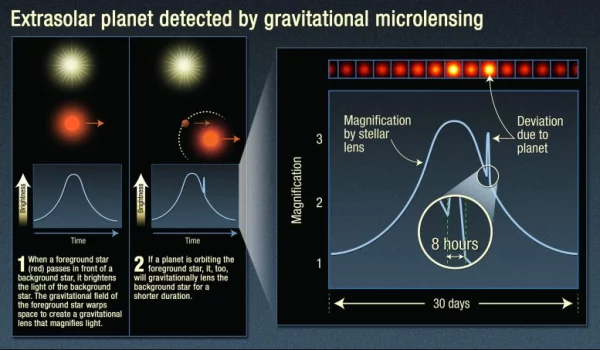The Milky Way, home to countless cosmic mysteries, is estimated to contain at least 100 billion planets. This astonishing discovery comes from a study conducted by an international team of astronomers, led by Kailash Sahu from the Space Telescope Science Institute (STScI) in Baltimore, Maryland. Using the microlensing technique, they have opened a new door to understanding planets outside our Solar System.
“Most stars in the Milky Way have at least one planet, and this possibility suggests that the actual number of planets could be far greater,” Sahu emphasized in a paper published in the journal Nature in January 2012.
The microlensing technique, which relies on the phenomenon of gravitational lensing bending light, enables scientists to detect planets far from their central stars. A notable example includes planets at distances similar to Saturn or Neptune in our Solar System. This method is particularly effective as it is not limited to planets with close orbits to their stars, but also allows the detection of smaller planets like Mercury.
“Microlensing has allowed us to identify over 10 billion Earth-sized planets in the Milky Way,” the research team reported. This marks the first time a technology has demonstrated such precise capabilities in measuring the size and distance of planets.

Analysis of data from around 40 microlensing events has shown that each star in the Milky Way is likely to host at least one planet. Another remarkable finding is that within 50 light-years of Earth, there are approximately 1,500 planets with environmental conditions similar to Earth, offering new possibilities for the search for extraterrestrial life.
“The potential existence of Earth-like planets with climates and liquid water is what we are striving to uncover. This not only deepens our understanding of the universe’s structure but also sparks significant hope for finding alien life,” according to a report by researchers from the University of Tokyo, published in 2020 in the journal Astronomy & Astrophysics.
“The universe is no longer an unfamiliar place but rather becomes more intimate as we realize there could be billions of Earth-like planets,” the paper concluded.
This discovery not only fuels public curiosity but also drives space missions such as the James Webb Space Telescope (JWST) and other exoplanet exploration projects. Advanced technologies are propelling humanity further in the quest for answers about life beyond the Solar System.


HPX24h > Space > Over 100 Billion Planets in the Milky Way: Astonishing Discoveries About the Universe
Tagged Articles
Three Earth-Like Planets That Could Support Life: New Discovery from NASA
Top Reads from This Category
Space
3D Lunar Map: A New Gateway to Understanding the Universe
Space
Jupiter-Like Planets: The Key to Unlocking Earth-Like Worlds
Space
Exploring Saturn’s Moon Phoebe: Planet-Like Features and Characteristics
Space
Gamma Ray Bursts and the Key to the Chemical Composition of the Early Universe
Space
Scientists Believe Water Ice Could Exist on the Giant Asteroid Vesta
Space
The Smallest Star System with Three Exoplanets Found by NASA’s Kepler
Space
The Milky Way’s Central Black Hole: The Asteroid Annihilator
Discover New Topics
Fitness
Fat-Burning Heart Rate: The Key to Optimizing Your Workout
Animals
Secrets to Surviving Antarctic Freezing Cold Through RNA Editing
Animals
The Stunning Image of a Cheetah in Action During Its Hunt
Health
Natural Remedies for Stomach Pain Every Parent Should Know
Uncategorized
Why Do Experts Believe Alzheimer’s Is an Autoimmune Disease Rather Than a Brain Disorder?
Fitness
Muscles: The Golden Key to Effective Health and Performance
Fitness
How Long Does It Take to Build Muscle?
Fitness
Effective Workout Tips: The Best Full-Body Exercises for Health
Parenting Tips
Why Do Preschoolers Have the Habit of Nose Picking?
Parenting Tips
Fun Facts for 3-Year-Olds: Exploring the World of Animals and New Foods
Health
How Losing Just 5% of Your Weight Can Reduce the Risk of Diabetes
Healthy Eating
Understanding the Important Role of Carbohydrates in Health
Health
5 Tips to Help You Overcome Smartphone Addiction